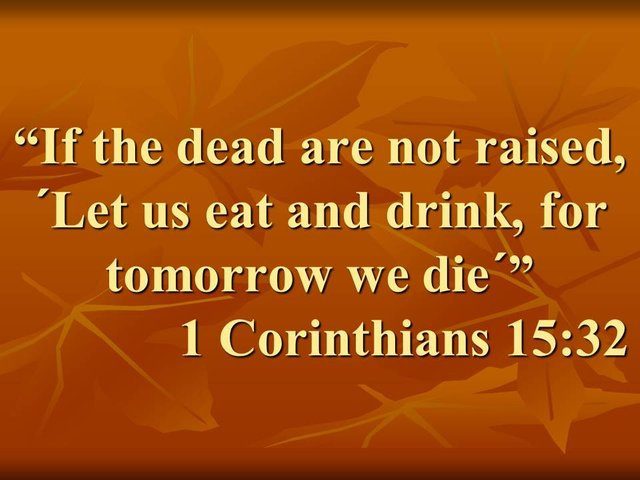Bible tools: If the dead are not raised, ´Let us eat and drink, for tomorrow we die´. 1 Corinthians 15:32
The first letter to the Corinthians is a letter addressed to a Christian community in a Greek city. The Greeks by philosophical education had very different ideas about the nature of the soul and the destiny of man, in the thought of the philosopher Plato, and more particularly in his book the Phaedo, the soul was immortal and the body a mere covering.
That is why Paul dedicates part of his letter to the doctrine of the "resurrection of the body", a doctrine that was shocking to classical philosophy; Jesus rose from the dead and through him we are called to a form of immortality: "So will it be with the resurrection of the dead. The body that is sown is perishable, it is raised imperishable; it is sown in dishonor, it is raised in glory; it is sown in weakness, it is raised in power; it is sown a natural body, it is raised a spiritual body. If there is a natural body, there is also a spiritual body.", 1 Corinthians 15:42-44.
Christian hope in an eschatological sense is based on this doctrine: "And if Christ has not been raised, our preaching is useless and so is your faith.", 1 Corinthians 15:14.
Those who deny God and the resurrection on Judgment Day, the apostle Paul explains to us how they think, "we only live once": "If the dead are not raised, ´Let us eat and drink, for tomorrow we die´", 1 Corinthians 15:32.

From the point of view of theology, the resurrection is a form of immortality ("In kinship with wisdom there is immortality", Wisdom 8:17), the resurrection is perfect immortality, immortality without changes, because all change is like a death. Immortality in the Old Testament designates the gift of longevity; and in the bible longevity is associated with contemplative life (eternal life).
Jesus as the new Adam personifies the resurrection: "I am the resurrection and the life", John 11:25.
For more information visit my profile follow the link and download for free my ebook.